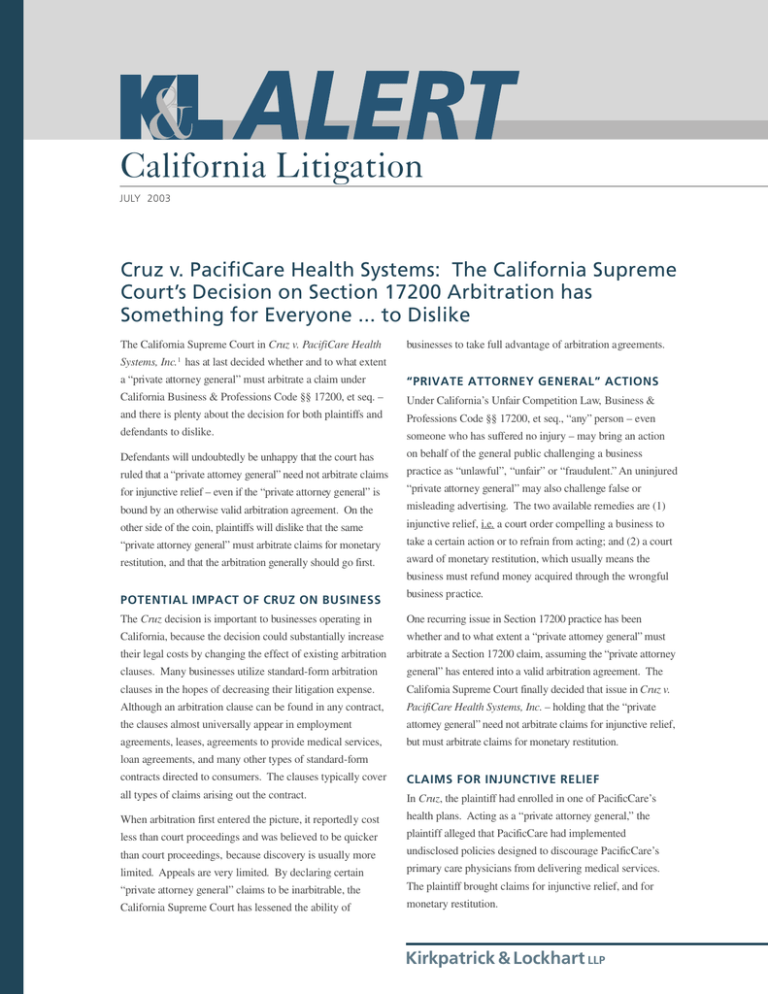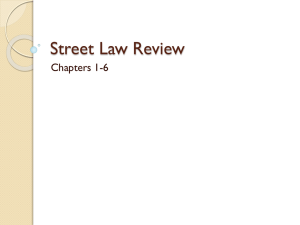
California Litigation
JULY 2003
Cruz v. PacifiCare Health Systems: The California Supreme
Court’s Decision on Section 17200 Arbitration has
Something for Everyone ... to Dislike
The California Supreme Court in Cruz v. PacifiCare Health
businesses to take full advantage of arbitration agreements.
Systems, Inc.1 has at last decided whether and to what extent
a “private attorney general” must arbitrate a claim under
“PRIVATE ATTORNEY GENERAL” ACTIONS
California Business & Professions Code §§ 17200, et seq. –
Under California’s Unfair Competition Law, Business &
and there is plenty about the decision for both plaintiffs and
Professions Code §§ 17200, et seq., “any” person – even
defendants to dislike.
someone who has suffered no injury – may bring an action
Defendants will undoubtedly be unhappy that the court has
on behalf of the general public challenging a business
ruled that a “private attorney general” need not arbitrate claims
practice as “unlawful”, “unfair” or “fraudulent.” An uninjured
for injunctive relief – even if the “private attorney general” is
“private attorney general” may also challenge false or
bound by an otherwise valid arbitration agreement. On the
misleading advertising. The two available remedies are (1)
other side of the coin, plaintiffs will dislike that the same
injunctive relief, i.e. a court order compelling a business to
“private attorney general” must arbitrate claims for monetary
take a certain action or to refrain from acting; and (2) a court
restitution, and that the arbitration generally should go first.
award of monetary restitution, which usually means the
business must refund money acquired through the wrongful
POTENTIAL IMPACT OF CRUZ ON BUSINESS
business practice.
The Cruz decision is important to businesses operating in
One recurring issue in Section 17200 practice has been
California, because the decision could substantially increase
whether and to what extent a “private attorney general” must
their legal costs by changing the effect of existing arbitration
arbitrate a Section 17200 claim, assuming the “private attorney
clauses. Many businesses utilize standard-form arbitration
general” has entered into a valid arbitration agreement. The
clauses in the hopes of decreasing their litigation expense.
California Supreme Court finally decided that issue in Cruz v.
Although an arbitration clause can be found in any contract,
PacifiCare Health Systems, Inc. – holding that the “private
the clauses almost universally appear in employment
attorney general” need not arbitrate claims for injunctive relief,
agreements, leases, agreements to provide medical services,
but must arbitrate claims for monetary restitution.
loan agreements, and many other types of standard-form
contracts directed to consumers. The clauses typically cover
CLAIMS FOR INJUNCTIVE RELIEF
all types of claims arising out the contract.
In Cruz, the plaintiff had enrolled in one of PacificCare’s
When arbitration first entered the picture, it reportedly cost
health plans. Acting as a “private attorney general,” the
less than court proceedings and was believed to be quicker
plaintiff alleged that PacificCare had implemented
than court proceedings, because discovery is usually more
undisclosed policies designed to discourage PacificCare’s
limited. Appeals are very limited. By declaring certain
primary care physicians from delivering medical services.
“private attorney general” claims to be inarbitrable, the
The plaintiff brought claims for injunctive relief, and for
California Supreme Court has lessened the ability of
monetary restitution.
Kirkpatrick & Lockhart LLP
PacificCare moved for a court order compelling the plaintiff
CONCLUSION
to arbitrate his claims, and to stay the court action until the
Although the Cruz decision resolves a frequently litigated
arbitration was complete. The plaintiff argued that he did not
and expensive procedural issue, the decision does not clearly
have to arbitrate his claim for injunctive relief, citing a prior
favor either plaintiffs or defendants. As Justice Baxter
California Supreme Court case, Broughton v. Cigna
pointed out in his dissent, the decision will likely compound
Heathplans. In Broughton, the Court held that claims for
the cost of litigating Section 17200 suits that involve
injunctive relief brought under a consumer protection statute
arbitration clauses. Beyond that, the Cruz case does not
2
similar to Section 17200 for the public benefit were not
answer the next question in the Section 17200 arbitration
subject to arbitration. The trial court agreed with the
analysis – what happens when a “private attorney general”
plaintiff, and refused to order the plaintiff to arbitrate his
who is not subject to an arbitration clause brings suit on
claim for injunctive relief.
behalf of those who are? For that, we must await further
pronouncements from the California appellate courts.
The supreme court upheld the trial court’s decision on that
point. Because the plaintiff sought injunctive relief for the
1 30 Cal. 4th 303 (2003).
public’s benefit under Section 17200, the Court found that
2 21 Cal. 4th 1066 (1999).
the earlier Broughton case controlled. As in Broughton, the
Court held that a “private attorney general” need not arbitrate
MATTHEW G. BALL
claims for injunctive relief because (1) the injunctive relief is
mball@kl.com
415.249.1014
not sought to benefit a private party, but to benefit the public
as a whole; and (2) a court is better able than an arbitrator to
oversee an injunction, which may require ongoing
supervision.
CLAIMS FOR MONEY RESTITUTION
The trial court in Cruz also held that a “private attorney
general” need not arbitrate claims for monetary restitution.
The supreme court disagreed for two reasons. First, the court
noted that the United States Supreme Court has long held
that claims for damages were “fully arbitrable,” and could see
no difference between monetary restitution and damages in
the arbitration context. Second, the court found that an
arbitrator is perfectly capable of overseeing restitution to the
general public, because a restitution award does not require
ongoing supervision the way that an injunction does.
ARBITRATION MUST
GENERALLY COME FIRST
The court further answered the natural question posed by its
rulings: which comes first, arbitration or court proceedings?
If you would like to discuss California’s Unfair Competition Law
in greater detail, please contact the author of this artticle, or any
one of the following K&L California Litigation Group lawyers:
Los Angeles
Richard P. Crane
310.552.5089
rcrane@kl.com
Dennis M. P. Ehling 310.552.5090
dehling@kl.com
Robert Feyder
310.552.5023
rfeyder@kl.com
Michael Mallow
310.552.5038
mmallow@kl.com
Tom Petrides
310.552.5077
tpetrides@kl.com
David Schack
310.552.5061
dschack@kl.com
Ron Stevens
310.552.5000
rstevens@kl.com
Paul Sweeney
310.552.5055
psweeney@kl.com
Fred Ufkes
310.552.5079
fufkes@kl.com
San Francisco
Jon Cohen
Ed Sangster
415.249.1001
415.249.1028
jcohen@kl.com
esangster@kl.com
Addresses
10100 Santa Monica Boulevard, Seventh Floor
Los Angeles, California 90067
Four Embarcadero Center, 10th Floor
San Francisco, California 94111
The court held that a trial court can and generally should stay
the proceedings in the trial court to let the arbitration or
restitution claims proceed, in order to avoid disrupting the
®
arbitration and rendering it ineffective.
Kirkpatrick & Lockhart LLP
Challenge us. ®
www.kl.com
BOSTON
■
DALLAS
■
HARRISBURG
■
LOS ANGELES
■
MIAMI
■
NEWARK
■
NEW YORK
■
PITTSBURGH
■
SAN FRANCISCO
■
WASHINGTON
.........................................................................................................................................................
This bulletin is for informational purposes and does not contain or convey legal advice. The information herein
should not be used or relied upon in regard to any particular facts or circumstances without first consulting a lawyer.
© 2003 KIRKPATRICK & LOCKHART LLP.
ALL RIGHTS RESERVED.






